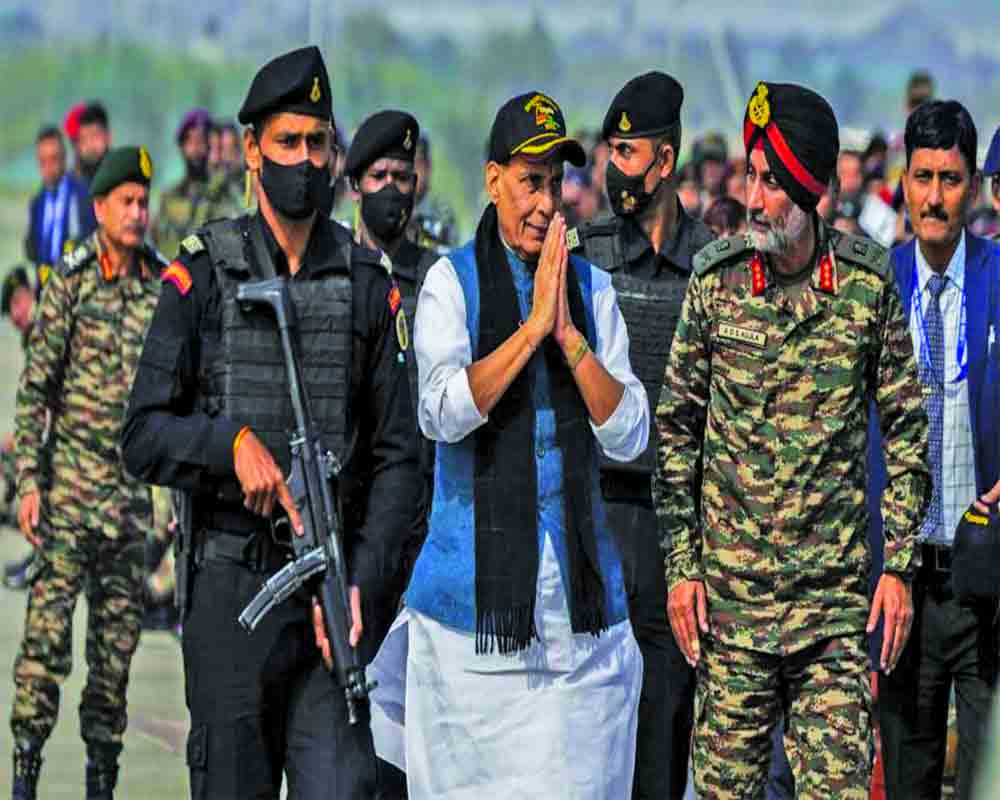Retrieving Pakistan-occupied Jammu and Kashmir(PoJK) would be a great service to its people who live in subhuman conditions
Addressing the Infantry Day function in Srinagar on 27th October, Defence Minister Raj Nath Singh said that India is committed to implementing the 1994 resolution passed by Parliament about the retrieval of Pakistan-occupied Jammu and Kashmir(PoJK) under illegal occupation of Pakistan. He pointed out that the Pakistani government is sowing seeds of hatred in PoJK and the time is not far when people will resort to mass rebellion there.
These illegally occupied areas of the then princely state of Jammu and Kashmir comprise about thirty-five per cent of its total area. By virtue of the accession of the ruler of the then princely state of Jammu and Kashmir Maharaja Hari Singh to India in 1947, the sovereignty of the whole erstwhile State of Jammu and Kashmir lies wholly and solely with India.
Steeped in abject poverty and backwardness, this illegally occupied area is still considered to be the most neglected area in the whole of South Asia. Despite violent protests by people at every stage, Pakistan has illegally, forcefully and through underhand means changed the frontiers and composition of these areas beyond recognition. After illegally occupying the areas following aggression on the then princely state of Jammu and Kashmir in 1947, Pakistan established an administrative structure in the occupied area named as Azad Jammu and Kashmir government. Even with a nominal legislature, the government there continues to be under strict control of the Pakistan government.
During the late seventies of last century, Pakistan started to take steps to bifurcate the subsequently extended occupied areas into two parts, one it had already named as Azad Jammu and Kashmir and the other as Northern Areas comprising Gilgit-Baltistan, which it had deemed to be a separate geographical entity to be administered federally by Pakistan. The Northern Areas are mostly inhabited by Shia Muslims and Pakistan also initiated steps for demographic change in the area. This resulted in violent protests by the people. Even the so-called Azad Jammu and Kashmir governments too protested tooth and nail against this bifurcation and also instituted a suit in its court. But so great was Pakistan`s urge to keep the fruits of aggression and to extend the borders of Pakistan illegally that it ignored all opposition and continued to resort to illegal means including torture to make it a federally administered area with nomenclature as Northern Areas.
Earlier too in utter disregard for the law and territorial integrity and sovereignty of India, Pakistan had ceded Shakasgam track territory in this illegally occupied Northern area to China when the Sino-Pak Frontier agreement was signed in 1963. It has also since annexed Chitral, Hunza, and Nagar and other territories in or around Northern Areas including Punial, Ishkoman, and Yasin which formed a part of the then princely State of Jammu and Kashmir or were under its suzerainty at the time of its accession to India in 1947.
Pakistan again changed the status of Northern Areas on the twenty-first of May in 2018 when it promulgated Gilgit Baltistan Order replacing its earlier Gilgit-Baltistan empowerment and self-government order of 2009. Under the new Order, all powers exercised by Gilgit-Baltistan Council were given to Gilgit-Baltistan Assembly. But the Council was retained as an advisory body for federal functions in the Northern Areas. Thus legislative powers on key subjects are vested in the Prime Minister of Pakistan and not in the elected Assembly. There were protests against this order not only in the area but at many places in Pakistan also. This reform package was seen as a precursor to attempts by Pakistan to make this area its fifth province as also to change its demographic composition.
This perception was confirmed when in 2020 the then-Pakistan Prime Minister Imran Khan announced provisional provincial status for the territory. Again in violation of international law and the sovereignty of India and amid strong protests by people in Pakistan-occupied Jammu and Kashmir, Pakistan permitted China to run China Pakistan Economic Corridor Project which passes through this Gilgit-Baltistan territory. Even the UN Economic and Social
Commission for Asia Pacific in its report in May 2017 stated that the CPEC Project could create geo-political tensions with India and lead to further instability in the region. Though reportedly prepared at the request of the Chinese government, the report also pointed out concerns about its social and environmental safeguards. The provision of proposed provincial status to Northern Areas by Pakistan appears to be an attempt to lend legal cover to the much-criticized CPEC Project which runs through Gilgit Baltistan, an Indian territory.
India has already strongly protested against this yet another severe illegality of Pakistan. The Defence Minister of India has now made it clear that India is committed to retrieving these illegally occupied areas of India. If Pakistan still chooses to continue to hold on illegally to these areas of Union Territories of Jammu and Kashmir and Ladakh it will mean continued violation of the sovereignty and territorial integrity of India. This will lead to more instability in the region. For overall development, India desires peace with Pakistan, but Pakistan`s action could lead to one more war over Jammu and Kashmir which could be far more dangerous.
(The writer is a former IIS officer/accredited freelance journalist/producer. The views expressed are personal)
























